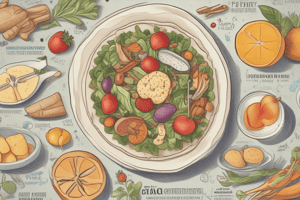Podcast
Questions and Answers
Which of the following is a non-heme source of iron?
Which of the following is a non-heme source of iron?
- Turkey
- Ground beef
- Salmon
- Dried beans (correct)
Which of the following foods should be included in the teaching for high vitamin D content?
Which of the following foods should be included in the teaching for high vitamin D content?
- 6 medium raw strawberries
- 2 large, poached eggs (correct)
- 1/2 cup boiled Brussel sprouts
- 1 cup of steamed long-grain brown rice
Which of the following foods is a major source of magnesium?
Which of the following foods is a major source of magnesium?
- Tomatoes
- Oranges
- Eggs
- Tuna (correct)
Which of the following dietary recommendations should the nurse include?
Which of the following dietary recommendations should the nurse include?
Which of the following conditions is associated with a deficiency of vitamin C?
Which of the following conditions is associated with a deficiency of vitamin C?
Which statement should the nurse include about how the body processes food?
Which statement should the nurse include about how the body processes food?
Which medication increases the body's rate of metabolism?
Which medication increases the body's rate of metabolism?
Which factors increase basal metabolic rate (BMR)?
Which factors increase basal metabolic rate (BMR)?
Which of the following causes a negative nitrogen balance?
Which of the following causes a negative nitrogen balance?
Which client BMI is identified as overweight?
Which client BMI is identified as overweight?
Which value indicates a client is in a catabolic state?
Which value indicates a client is in a catabolic state?
Which clinical findings are suggestive of malnutrition?
Which clinical findings are suggestive of malnutrition?
Which risk factors should be included for developing osteoporosis?
Which risk factors should be included for developing osteoporosis?
Which nutrients may be deficient in someone following vegan dietary practices?
Which nutrients may be deficient in someone following vegan dietary practices?
Which information should be included regarding saturated fat intake?
Which information should be included regarding saturated fat intake?
Which essential nutrients are necessary for normal functioning of the nervous system?
Which essential nutrients are necessary for normal functioning of the nervous system?
Which components are required on food labels?
Which components are required on food labels?
Which information regarding food borne illness should be included?
Which information regarding food borne illness should be included?
Which foods can infants typically outgrow sensitivity to?
Which foods can infants typically outgrow sensitivity to?
Consuming which food while taking phenelzine could cause a hypertensive crisis?
Consuming which food while taking phenelzine could cause a hypertensive crisis?
Flashcards are hidden until you start studying
Study Notes
Anemia and Iron Intake
- Non-heme source of iron: Dried beans.
- Important for clients with anemia to include iron-rich foods.
Vitamin D Sources
- Foods high in vitamin D include 2 large poached eggs.
- Essential for individuals who cannot get sunlight exposure.
Magnesium Sources
- Major source of magnesium: Tuna.
- Important to incorporate into the diet for overall health.
Nutritional Recommendations
- Protein intake should be 10% to 35% of total daily calories.
- Essential guideline for balanced nutrition.
Vitamin C Deficiency
- Scurvy and bleeding gums are conditions associated with vitamin C deficiency.
- Vital to educate on the importance of vitamin C-rich foods.
Food Processing in the Body
- The liver converts unused glucose into glycogen.
- Key process for energy storage in the body.
Metabolism and Medications
- Levothyroxine increases the body's rate of metabolism.
- Understanding medication effects is crucial for patient education.
Basal Metabolic Rate (BMR) Influencers
- Factors increasing BMR: Lactation, prolonged stress, puberty.
- Important for understanding energy needs.
Negative Nitrogen Balance
- Illness, malnutrition, and trauma can cause negative nitrogen balance.
- Indicates the body is using protein faster than it can synthesize.
Signs of Malnutrition
- Clinical findings suggestive of malnutrition include poor wound healing, dry hair, weak hand grips, impaired coordination.
- Recognizing these signs is vital for intervention.
Osteoporosis Risk Factors
- Risk factors for osteoporosis: Inactivity, family history, cigarette smoking.
- Important to address these in patient education for prevention strategies.
Vegan Nutritional Needs
- Risks for vegans include deficiencies in vitamin D, calcium, and vitamin B12.
- Educating on plant-based sources of these nutrients is essential.
Nutritional Education on Fat Intake
- Aim to limit saturated fat to 7% of total daily intake.
- Important guideline for heart health and overall nutrition.
Essential Nutrients for Nervous System
- Essential nutrients include calcium, thiamin, vitamin B6, and sodium.
- Crucial for the proper functioning of the nervous system.
Reading Food Labels
- Required components of food labels include total carbohydrates, total fat, calories, and dietary fiber.
- Understanding labels promotes informed food choices.
Food Safety and Illness
- Unpasteurized fruit juice is a common cause of food-borne illness.
- Important information to emphasize in food safety education.
Food Allergies in Infants
- Common allergens that infants outgrow include soy and cow's milk.
- Educating new parents can aid in managing food sensitivity.
Medication and Diet Interactions
- Foods like smoked fish may cause a hypertensive crisis when taking phenelzine.
- Critical for patients to understand dietary restrictions with certain medications.
Studying That Suits You
Use AI to generate personalized quizzes and flashcards to suit your learning preferences.




